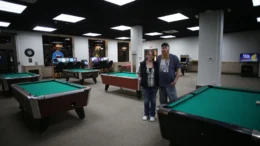LAS VEGAS (AP) — Would you pay $40 to watch a movie in the comfort of your own home 10 days after its big-screen release? How about $30 after 45 days?
These are just a few of the ideas being thrown around by major Hollywood studios looking to more effectively compete with streaming services, television, smartphones and everything else that consumers can choose to spend their time with nowadays.
Premium video on demand (PVOD) is less disruptive than Sean Parker’s troubled Screening Room idea, which would have offered movies in the home for $50 on the same day they’re released in theaters. Yet PVOD still had many questioning its merits this past week at the theater industry’s CinemaCon in Las Vegas, from big studio execs to small theater owners, and stars and filmmakers in between.
For most exhibitors, shortening the theatrical window, as the industry calls it, from the traditional 90 days is seen as a bad idea, especially for those who’ve invested large sums of money to upgrade seats and projection tools at the behest of the studios.
“The shortening of the theatrical window would be horrible for the entire industry,” said Glen Gray, an exhibitor from South Florida.
As would be expected at an annual gathering of exhibitors, from big theater chains to single-screen operations — many studio executives were quick to emphasize their commitment to the theatrical experience.
“Netflix, my ass,” said Sony chairman Tom Rothman after showing some footage from “Blade Runner 2049.”
Others took a more subtle approach.
Dave Hollis, the executive vice president of distribution at the Walt Disney Company, used his platform to speak on behalf of his company and other Hollywood studios to tell exhibitors that they “all believe deeply that films should be seen in a theater” and that they “have a common goal to get people to see them in your cinemas.”
Even Amazon Studios, with its blatant streaming strategy, offered encouragement to theater owners.
“We really believe in the theatrical experience by fully supporting the theatrical window for our releases,” said Jason Ropell, Amazon’s head of motion pictures, noting that “Manchester by the Sea” is in its “19th week and counting” in theaters.
But there’s no question the marketplace is changing. The North American box office may have reached record highs the past two years, yet attendance has remained nearly flat for over a decade. In other words, growth is coming from higher ticket prices, not more people seeing movies.
Warner Bros. marketing and distribution chief Sue Kroll was the rare executive at CinemaCon to speak openly about theatrical threats.
Customers, she said, “want more choices in where and how they consume our content.”
“Where there is demand, somebody is going to step in and fill that void,” Kroll said. “We have to be creative and innovative in addressing the challenges of this marketplace, as we always have (and) … move toward a future that will be beneficial and profitable to all of us.”
Moments later, director Christopher Nolan took the stage to preview footage from his ambitious, large-format celluloid epic “Dunkirk” and offered a different view from Kroll, who is distributing his film.
“The only platform I’m interested in talking about is theatrical exhibition,” Nolan said. The usually quiet audience erupted into applause.
Earlier, the director told The Associated Press that while the threat is nothing new, it’s also not something filmmakers are, “particularly excited about.”
“You really want your film to be in theaters as long as possible because that’s where they are meant to be seen,” Nolan said.
Indeed, most of the filmmakers sided with Nolan, including “Arrival” and “Blade Runner 2049” director Denis Villeneuve, who said he will “always make movies for massive screens,” and “Downsizing” director Alexander Payne.
“I don’t work in television, I work in cinema and I like my films to be seen on the big screen. Period,” Payne said.
Others, like George Clooney and Matt Damon, recognize that the tide is turning.
“I think it’s inevitable in some way,” Clooney said. “But people still go to concerts because at some point, you’ve got to go out. You can’t keep telling your wife, ‘Oh honey, let’s stay home and watch TV’ … I don’t think it’s mutually exclusive. I think both can survive.”
Damon was more wistful. He sees how his kids can watch whatever they want when they want and how marked a difference it is from how he grew up experiencing movies.
“It seems to make sense that there will be some sort of necessary shift,” Damon said. “I feel like people will always want to take in stories like that and movies won’t become obsolete … but people who did vaudeville probably felt that way too.”
Even Charlie Hunnam admitted he finds himself waiting to see things at home, as much as he loves the theatrical experience.
“Time is so precious and life is so frenzied and sometimes if you don’t catch it at the right time, there are people sneezing in your ear, being on their phones,” he said.
Chris Meledandri, the CEO of Illumination Entertainment, who has overseen animated hits like “The Secret Life of Pets,” views the looming changes in movie consumption as a pointed challenge for Hollywood. He says filmmakers and studios must continue making the cinematic experience “dynamic and relevant so that there’s an organic drive to the theater.”
“It becomes our responsibility,” Meledrandri implored, “to produce for the reality in which we live and to create films that — regardless of what the distribution strategy is — will compel audiences into the theater.”


































